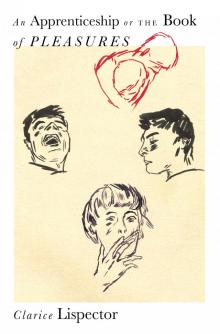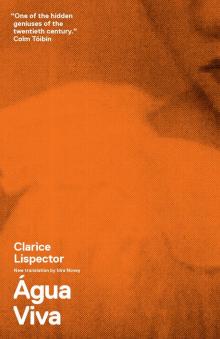- Home
- Clarice Lispector
Complete Stories Page 8
Complete Stories Read online
Page 8
She wanted to sit down on a park bench, because she actually couldn’t feel the rain and didn’t mind the cold. Just a little scared was all, because she still hadn’t decided which way to go. The bench would be a place to rest. But the passersby were looking at her curiously so she kept going.
She was tired. She was always thinking: “But what’ll happen now?” If she kept walking. That wasn’t the solution. Go back home? No. She worried that some force would push her back to her point of departure. Feeling dizzy, she closed her eyes and imagined a great whirlwind emerging from “Elvira’s House,” violently sucking her in and depositing her by the window, book in hand, recomposing the everyday scene. She got scared. She waited for a moment when no one was coming to say with all her might: “You’re not going back.” She calmed down.
Now that she’d decided to leave, everything was being reborn. If she weren’t so confused, she’d have taken an infinite liking to the thought she’d had after two hours: “Well, things still exist.” Yes, that discovery was simply extraordinary. She’d been married for twelve years and three hours of freedom had restored her almost entirely to herself: — the first thing to do was see if things still existed. If she were performing this same tragedy on stage, she’d pat, pinch herself to make sure she was awake. The last thing she wanted to do, though, was perform.
Joy and relief, however, weren’t the only things inside her. There was also a little fear and twelve years.
She crossed the pedestrian bridge and leaned against the seawall, to gaze at the ocean. It was still raining. She’d caught the bus in Tijuca and got off at Glória. She’d already walked past the Morro da Viúva.
The ocean was churning powerfully and, when the waves broke against the rocks, the salt foam completely sprayed her. She stood for a moment wondering whether that was a deep patch, because it was getting impossible to guess: the dark, shadowy waters could be centimeters above the sand just as easily as they could be obscuring the infinite. She decided to try that game again, now that she was free. All she had to do was gaze lingeringly into the water and think about how that world was boundless. It was as if she were drowning and never touched the bottom of the sea with her feet. A heavy anguish. So then why did she seek it out?
The story about not touching the bottom of the sea was an old one, it went back to her childhood. In the chapter on the force of gravity, in elementary school, she’d invented a man with a funny disease. The force of gravity didn’t work on him . . . So he’d fall off the earth, and keep falling evermore, because she didn’t know how to give him a destiny. Where was he falling? Later she figured it out: he kept falling, falling and got used to it, eventually learning how to eat falling, sleep falling, live falling, until he died. And would he keep falling? But right then her memory of the man didn’t bother her and, on the contrary, it brought her a taste of freedom she hadn’t experienced in twelve years. Because her husband had a singular feature: his mere presence made her slightest movements of thought freeze up. At first, this brought her a certain peace, since she used to tire herself out thinking about useless things, even if they amused her.
Now the rain has stopped. It’s just cold and feels good. I’m not going home. Ah, yes, that is infinitely comforting. Will he be surprised? Yes, twelve years weigh on a person like pounds of lead. The days melt into one another, merge to form one whole block, a big anchor. And the person is lost. Her gaze starts evoking a deep well. Dark and silent water. Her gestures go blank and she has but one fear in life: that something will come along and transform her. She is living behind a window, peering through the glass as the rainy season covers the season of sun, then becomes summer and then the rains again. Desires are ghosts that dissolve as soon as you light the lamp of good sense. Why is it that husbands are good sense? Hers is particularly solid, good, and never wrong. The sort who only uses one brand of pencil and knows by heart what’s written on the soles of his shoes. You can ask him without hesitation about the train schedule, which newspaper has the highest circulation and even in what region of the globe monkeys reproduce the fastest.
She laughs. Now she can laugh . . . I used to eat falling, sleep falling, live falling. I’ll look for a place to rest my feet . . .
She found this thought so funny that she leaned against the wall and started laughing. A fat man stopped at a distance, staring at her. What do I do? Maybe come up and say: “Son, it’s raining.” No. “Son, I used to be a married woman and now I’m a woman.” She started walking and forgot the fat man.
She opens her mouth and feels cool air flood it. Why did she wait so long for this renewal? Just today, after twelve centuries. She’d stepped out of the cold shower, put on some light clothes, grabbed a book. But today was different from all the afternoons of the days of all the years. It was hot and she was suffocating. She opened all the windows and doors. But no: the air was there, stagnant, solemn, heavy. Not a single breeze and the sky looming, the clouds dark, dense.
How did that happen? At first just the distress and the heat. Then something inside her began to grow. All of a sudden, in laborious, painstaking movements, she pulled the clothes off her body, ripped them apart, tore them into long strips. The air was closing in on her, constricting her. Then a loud thundering shook the house. Almost at the same time, swollen drops of warm water began falling here and there.
She stood still in the middle of the bedroom, panting. The rain fell harder. She heard its drumming on the tin roof in the yard and the shouts of the maid pulling the wash from the line. Now it was like a deluge. A cool wind was blowing through the house, stroking her hot face. She felt calmer, then. She got dressed, took all the money in the house and left.
Now she’s hungry. It’s been twelve years since she’s felt hunger. She’ll go to a restaurant. The bread is fresh, the soup is hot. She’ll order a cup of coffee, a cup of strong, fragrant coffee. Ah, how beautiful and enchanting everything is. The hotel room feels foreign, the pillow is soft, the clean sheets scented. And when darkness claims the room, an enormous moon will appear, after this rain, a cool and serene moon. And she’ll sleep bathed in moonlight . . .
Daybreak will come. She’ll have the morning free to buy what she needs for the journey, because the ship departs at two in the afternoon. The sea is calm, almost no waves. The sky a violent, strident blue. The ship moves swiftly into the distance . . . And soon after the silence. The waters sing against its hull, liltingly, rhythmically . . . All around, seagulls hover, white foam escaped from the sea. Yes, all that!
But she doesn’t have enough money for a trip. The tickets are too expensive. And getting soaked by all that rain left her with a piercing chill. She could very well go to a hotel. That’s true. But hotels in Rio aren’t appropriate for an unaccompanied lady, except the first class ones. And in those she might run into one of her husband’s acquaintances, which would surely harm his business.
Oh, it’s all a lie. What’s the truth? Twelve years weigh like pounds of lead and the days close in on our bodies and constrict them more and more. I’m going home. I can’t be mad at myself, because I’m tired. And anyway it’s all just happening, I’m not provoking a thing. It’s been twelve years.
She goes into her house. It’s late and her husband is reading in bed. She tells him that Rosinha got sick. Didn’t he get her note letting him know she’d be home late? No, he says.
She drinks a glass of warm milk because she’s not hungry. She puts on some flannel pajamas, blue with white polka dots, very soft indeed. She asks her husband to turn off the light. He kisses her face and tells her to wake him at exactly seven o’clock. She promises, he turns off the light.
In the trees, a great and pure light rises.
She lies with her eyes open awhile. Then she dries her tears on the sheet, closes her eyes and gets settled in bed. She feels the moonlight fall across her slowly.
In the silence of the night, the ship moves farther and farther away.
>
Excerpt
(“Trecho”)
Really nothing happened on that gray afternoon in April. Everything, however, foretold a big day. He had alerted her that his arrival would constitute the great fact, the culminating event of their lives. That’s why she went into the Bar da Avenida, sat at one of the small tables by the window, in order to spot him, the moment he appeared on the corner. The waiter wiped the table and asked what she’d like. Now of all times she had no reason to be shy and afraid of committing a gaffe. She was waiting for someone, she answered. He eyed her a moment. “Do I look so forlorn that I couldn’t possibly be waiting for someone?” she told him:
“I’m waiting for a friend.”
And now she knew that her voice would come out perfectly: calm and casual. (Well it wasn’t the first time she was waiting for someone.) He rubbed at a nonexistent stain on the corner of the small marble table and, after a calculated pause, replied, without so much as looking at her:
“Yes, ma’am.”
She settles into the narrow chair. She crosses her legs with a certain elegance that, Cristiano himself had said, comes naturally to her. She holds her purse with both hands, lets out a relaxed sigh. There. All she has to do is wait.
Flora enjoys living very much. Very much indeed. This afternoon, for instance, despite her dress pinching at the waist and her waiting in horror for the moment she’ll have to stand and cross the long, narrow room in her too-tight skirt, despite all this she thinks it’s nice to be sitting there, among all those people, to have coffee with little cakes, like everybody else. She feels just like when she was little and her mother would give her “real” little pans to fill with food and play “housewife.”
All the little tables in the café are full. The men smoke fat cigars and the lads, stuffed into big, loose jackets, offer each other cigarettes. The women drink sodas and nibble at sweets with the daintiness of rodents, to avoid smearing their “lipstick.” The heat is sweltering and the fans drone on the walls. If she hadn’t been dressed in black she could have imagined herself in an African café, in Dakar or Cairo, amid handheld fans and dark men discussing illicit business dealings, for example. Amid spies even, who knows? stuffed into those Arabian sheets.
Naturally it was somewhat absurd to be playing at thinking on that afternoon of all days. Precisely when Cristiano had promised her the biggest day in the world and precisely, oh! Precisely when she was afraid nothing would happen . . . simply due to Cristiano’s absence . . . It was absurd, but whenever “things” happened to her she would intersperse these things with perfectly pointless and meaningless thoughts. Back when Nenê was about to be born and she was in the hospital, lying down, white and scared to death, she doggedly accompanied the buzzing of a fly around a teacup and came to think, in a general way about the tumultuous lives of flies. And in fact, she’d concluded, there are great studies to be done on these tiny beings. For instance: why is it that they, with those beautiful wings, don’t fly higher? Could it be that those wings were powerless or did flies lack ideals? Another question: what is the mental attitude of flies toward us? And toward the teacup, that big lake, sweetened and warm? Indeed, those problems were not unworthy of attention. We’re the ones still not worthy of them.
A couple entered. The man stopped in the doorway, at length chose a spot, then made his way over there with his wife under his arm, looking fierce like someone getting ready to defend a right: “I’m paying just as much as everyone else.” He sat, cast a defiant look around the room. The girl was shy and smiled at Flora, a smile of class solidarity.
Well, time is flying by. A waiter with a blond mustache heads toward Flora, acrobatically balancing a tray with a dark soda in a perspiring glass. Without asking a thing, he sets down the tray, puts the glass near her hands and moves off. But who ordered a drink, she thinks distraught. She stays still, without moving. Ah! Cristiano, come quick. It’s everyone against me . . . I don’t want soda, I want Cristiano! I feel like crying, because today’s a big day, because today’s the biggest day of my life. But I’m going to stuff into some corner hidden from me (behind the door? how ridiculous) everything that torments me until Cristiano gets here. I’m going to think about something. About what? “Dear sirs, dear sirs! Here I am ready for life! Dear sirs, no one’s looking at me, no one realizes I exist! Yet, dear sirs, I exist, I swear that I exist! Very much, even. Look, all of you, with that triumphant attitude, look: I can vibrate, vibrate like the taut string of a harp. I can suffer with more intensity than any of you gentlemen. I am superior. And do you know why? Because I know I exist.” And what if she drank the soda? At least that woman looking at her as if she weren’t there, as if she were an empty table, would see that she’s doing something.
She carefully picks out a straw, unwraps it with casual movements and takes the first sip. It was better that Nenê hadn’t come. The soda is very cold and Nenê wants to try everything she sees. When Cristiano comes, will he ask first about her or Nenê? Cristiano said the two of them were children, that in their group he was the only adult. But this doesn’t sadden Flora much. Once, in the beginning, he’d left her sitting in a corner of the bedroom and started pacing back and forth, rubbing his chin. Then he stopped in front of her, looked at her awhile and said: “But you’re a little girl!” Nevertheless, he eventually got used to it and Flora always pleased him. Also because ever since she was little she’d known how to play every role. With the Redhead boy she’d played the soldier who kills, with the downstairs neighbor girl she was a wagon driver, in high school she played the part of the Indian woman who has a flock of children, as well as a teacher, housewife, evil neighbor, beggar, cripple and greengrocer. With the Redhead she’d played soldier, forced by the circumstances, because she needed to win his admiration.
So it wasn’t hard to play Cristiano’s lover. And she did it so well that he, before leaving, said to her:
“You know, little girl, there’s more to you than I thought. No, you’re not just a little girl. You’re a woman full of good sense and independence.”
She enjoyed Cristiano’s praise like when he’d complimented her new dress. Or when the French teacher told her: “You weel yet be un bon poète!” Or when her mother used to say: “When this one grows up she’s going to catch them all!” Well now, of course she knew how to do lots of things and even very well. But she was in no way one of those people who became someone else just for fun or because she needed to. Flora was something else that no one had discovered yet! That was the mystery.
The soda is doing something awful to her. Her stomach is clenching in pangs of nausea. She closes her eyes a moment and sees the dark liquid churning round and round in waves, growling. And Cristiano isn’t coming. She’s been there an hour. If Cristiano got there right then he’d send for something bitter and the pangs of nausea would disappear. Then he’d say proudly: “I don’t know what you’d do on your own. You come up with things at just the wrong moment.” And why was there suddenly that taste of coffee in her mouth? She flags down the waiter. “Ice water,” she orders. After the first sip, she perks up:
“What was in that soda?”
“Coffee, miss.”
Ah, coffee. Ugh, it’s gotten worse. The waiter peers at her with curiosity and irony:
“Are you feeling better, mademoiselle?”
“Certainly, I wasn’t feeling anything at all.”
“Drink a cup of hot coffee and that’ll make it all go away,” he went on resolutely.
“Bring me one, please.”
“Cristiano, where are you? I am small, dear sirs, deep down I am the size of Nenê. Don’t you know who Nenê is? Well she’s blonde, with black eyes and Cristiano says he’s never surprised to see her little face all dirty. He says that in our messy bedroom, the fresh flowers, Nenê’s little face and my ‘poor dear’ look are inseparable. But there’s something wrong with my stomach. And Cristiano’s not coming. What if Cristiano does
n’t come? Our landlady, dear sirs, swears it’s quite common for young women with children to be abandoned. She knows of at least three cases. What are you all saying? Oh, don’t smoke right now.”
The waiter comes with the coffee. He has a beautiful blond mustache.
“If I were you, ma’am, I’d try to get rid of the soda. Plenty of people feel sick from coffee-flavored drinks. All you have to do is stick two fingers in the roof of your mouth. The toilette is on the left.”
Flora returns from there humiliated and doesn’t dare face the blond mustache. She leans back in the chair and feels miserably fine.
A cool breeze blows through the windows. “Declarations from Mussolini. Suicide in Leblon! Extra extra A Noite!” Faraway sounds of honking. Either Cristiano missed the train or he’s abandoned me forever.
The café has grown familiar to her eyes. The waiters are after all a bunch of silly, very busy men. They’re arranging the chairs on the bandstand, wiping the piano. Customers of another sort, the sort who after they’ve bathed and dined “must enjoy life while they’re still young men; and what else is money for?” settle at the little tables.
“Does that mean I’m lost,” Flora thinks.
She hears the start of muted drumming, rhythmic, singular and mysterious, rising from the bandstand. With growing effervescence, like little animals making bubbles in some unknown way, the rhythm intensifies. And suddenly, from the last black man in the second row, there rises a savage cry, sustained, until it dies in a sweet whimper. The mulatto in the first row twists all the way around, his instrument points into the air and responds with a hoarse, childlike “boop-boop.” The drumming resembles men and women springing side to side in a religious ceremony in Africa. Suddenly, silence. The piano sings out three notes, lone and serious. Silence.

 The Stream of Life
The Stream of Life The Complete Stories
The Complete Stories The Hour of the Star
The Hour of the Star The Besieged City
The Besieged City An Apprenticeship or the Book of Pleasures
An Apprenticeship or the Book of Pleasures The Chandelier
The Chandelier A Breath of Life
A Breath of Life The Apple in the Dark
The Apple in the Dark Agua Viva
Agua Viva Complete Stories
Complete Stories Near to the Wild Heart
Near to the Wild Heart The Hour of the Star ()
The Hour of the Star () The Passion According to G.H.
The Passion According to G.H. The Passion According to GH
The Passion According to GH